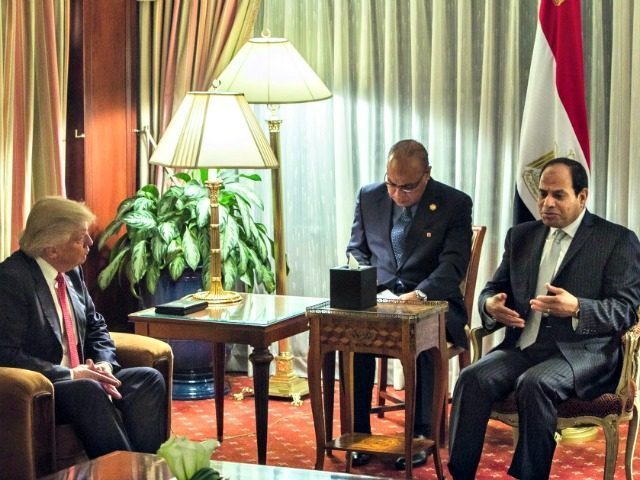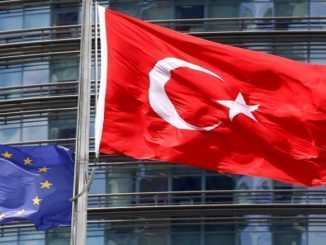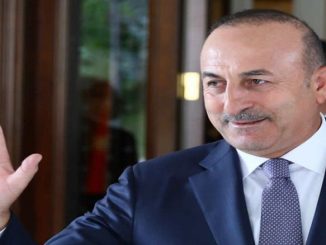
It seems that Donald Trump administration is about to take steps in favor of the al-Sisi regime amid a new horizon in the Egyptian-American relations.
World Net Daily, an American politically conservative news site, reported that President-elect Donald Trump is “preparing to jumpstart a bill in Congress that would ban the Muslim Brotherhood by declaring it a terrorist organization.”
Accordingly, this would consider an explicit shift in US foreign policy to bypass the bill introduced a year ago by US Senate Ted Cruz – the Republican senator of Texas.
Trump foreign-policy adviser Walid Pheres told Egyptian newspaper al-Youm7 that the legislation by U.S. Sen. Ted Cruz, “was held up due to the Obama administration’s support of the group. But Trump plans to back the bill.”
The bill, known as the Muslim Brotherhood Terrorist Designation Act of 2015-16, names the Brotherhood and three of its offshoots, including the Council on American-Islamic Relations and Islamic Society of North America, as a terrorist organization.
In fact, the Muslim Brotherhood is banned as a seditious organization in Russia and at least five Arab countries, including Syria, Saudi Arabia and its home base of Egypt. In 1997, the Brotherhood’s self-avowed “Palestine” branch – Hamas – was added to the U.S. State Department’s list of foreign terrorist organizations.
Moreover, a similar legislation was introduced by the former Rep. Michele Bachmann during her last term in office who said that such action is long overdue.
Bachmann said, “First, it is imperative to know the enemy.” She added, “The fundamental purpose of the Muslim Brotherhood is to supplant all societal structures, even in non-Islamic countries like the United States, with Islamic Shariah law.”
She also claimed that since the Holy Land Foundation terror financing trial in 2007-08 it was clear Brotherhood is working through front groups toward an agenda of Islamic supremacy, which the Brotherhood calls “civilization jihad”
In 2012, Bachmann introduced her legislation and she attacked at that time the Secretary of State Hillary Clinton’ top aide, Huma Abedin, and named him as an example of the Muslim Brotherhood agents who have infiltrated the federal government.
However, she came under intense pressure to drop the issue from both Democrats and Republicans. Among her critics was former Rep. Mike Rogers, R-Mich., who called Abedin “an American patriot.”
Rogers said, “I have no information in my committee that would indicate that Huma is anything other than an American patriot.”
Rogers’ name has been tossed out, along with that of Rep. Michael McCaul, R-Texas, as possible choices that Trump is considering for the job of secretary of the Department of Homeland Security.
Bachmann said she would recommend to see Rep. Steve King, R-Iowa, get the job. King is also one of 68 House co-sponsors of the Muslim Brotherhood Terrorist Designation Act.
Will the Muslim Brotherhood and its close organizations be chained under Trump presidency?
The newly released report by the conservative news site the world net daily infers the possibility of these actions.
The WND cited Bachmann opening fire against the Muslim Brotherhood activities in the US saying, “Across the U.S. are Muslim Brotherhood front groups which need to be exposed and dismantled.” she added, “The Muslim brotherhood’s goals include the overthrow of our constitutional republic.”
“In President Trump, we have someone willing to recognize America’s enemies and defeat them. This is welcome and long overdue.” In addition, the WND mentioned in criticism that,” Yet the Brotherhood and its various offshoots, such as CAIR and ISNA – are not only able to operate legally in America but have been offered seats at the highest echelons of power, in the White House, in the halls of Congress, in the military and in the departments of Justice and Homeland Security.”
It also pointed that the Democrats are considering placing Rep. Keith Ellison, D-Minn., who has been an enthusiastic supporter of CAIR and ISNA, into the party’s leadership as chairman of the Democratic National Committee, or DNC. Ellison is one of two Muslims in Congress, the other being Andre Carson, D-Ind.
“Various Islamic charities and leaders tied to the Brotherhood were already found to have been funding Hamas terrorists during the Holy Land Foundation trial of 2008,” reported WND.
The WND also cited the quoted Dr. Mark Christian, a former imam who grew up in Cairo, Egypt, the son of a prominent Muslim Brotherhood operative, who “agrees that taking down the Brotherhood is not enough. Trump will need to go after all of its front groups, like CAIR, ISNA, NAIT and the Muslim Student Association.”
Dr. Mark Christian was Muhammad Abdullah before he converted to Christianity and changed his name, but now he is the founder of Global Faith Institute.
He criticized that the Brotherhood was invited into the White House by the Clintons in 1996 saying that this has been ensconced there ever since. Every president since, including George W. Bush, has hosted Ramadan dinners and offered praise of Islam as a “religion of peace.”
Christian said, “When the leader of the free world embraces a terrorist organization, it alienates peaceful, reformist Muslims not only in America but across the world.”
He added, “Since 1996, the Muslim Brotherhood has been introduced into our government, into our military, and into our religious organizations under the cover of ‘interfaith’ dialogue, and so designating the Brotherhood as a terrorist organization is a very good first step, but it is way bigger than that.”
Christian also warned from the Muslim Brotherhood presence in both parties describing them as a cancer rooted in US governments. Christian said, “You are talking about not just an organization. You are talking about a cancer that was implanted into the U.S. government more than a decade ago.”
“And this cancer has been expanding ever since. With the election of Trump, you are talking about winning against the Bushes, the Obamas, and the Clintons,” he said.
“When it comes to Islam and the Muslim Brotherhood, they are all on the same page. So, you go back to 1996 and see how that cancer was implanted. To start changing the tide, you have to find and introduce the real progressive Muslims to be working with the government, and that is going to be a very tough job.
He added, “But it can be done with the will we have seen from Donald Trump.”
The WND cited Christian saying that he believes the truly progressive Muslims are afraid to speak out in the current environment where the Islamic message in America is 100% controlled by the Muslim Brotherhood.
In this context, Christian praised Abdel Fattah al-Sisi and said, “Sisi of Egypt is a very devout Muslim himself, but he is calling for reformation and progressiveness in the Islamic message.”
“He is the one who said we have to part with the idea that for 1.6 billion Muslims to live we have to kill [or convert] the 6 billion non-Muslims. We are not talking about reformation right now. We are talking about working with those who have it in their minds that they are willing to take that step. Give them the power to make their own reformation, based on sincere and honest intentions. And there are millions out there with them. It is not only that we allowed the Muslim Brotherhood into the U.S. and into White House, but for the last 20 years America has denied those progressive Muslims a stage where their voices could be heard.”
That’s why al-Sisi of Egypt was the first foreign leader to call and congratulate Trump on his victory, according to Christian
Christian said, “al-Sisi and his government in Egypt are celebrating because Trump won.”
Would al-Sisi -Trump alliance be likely to happen?
Right after Trump won the presidency of the United States of America, several political experts and research centers predict that the coming period will witness a flourishing alliance between Trump and al-Sisi military regime.
Carnegie Middles East Center mentioned that Trump presidency could signal a “significant shift in American–Egyptian relations,” which have cooled since the 2013 coup.
For example, the United States partially suspended military aid after the military coup in 2013, later it was restored in March 2015, citing a need to combat the Islamic State in Sinai.
According to Carnegie, “However, even though the United States restored aid, Abdel Fattah al-Sisi still has not been invited to the White House, a public snub to a close American ally. Trump, however, seems to have another policy regarding Egypt.”
In September 2016, when Trump met al-Sisi in New York, Trump praised Sisi’s efforts in his war on terror and stated that, if he were elected, the United States would be a friend to Egypt, not simply an ally.
In addition, this was followed by a promise to invite Sisi on an official state visit. In response, al-Sisi was quick to return the praise, stating that” Trump would be a strong president, one of the key points that Trump was using in his electoral platform.”
Carnegie added that this warming of relations can have a number of implications in terms of policy. “First, Trump’s brand of right-wing populism is likely to strengthen Sisi’s position internationally and domestically, since it is likely to create support for his continued repression of the Muslim Brotherhood and the secular opposition under the rubric of the War on Terror.’
In addition, various leaders in the GOP (the Republican party is usually referred to as the Grand Old Party GOP)-including Jeb Bush and Ted Cruz- have praised al-Sisi “signaling the affinity between the Egyptian regime and Republican Party at a time when repression was rampant in Egypt. “
Moreover, the pressure from Washington to reduce levels of repression and allow civil society to operate, which Clinton was expected was to exert, is not expected to be one of Trump’s priority.
In the end of its analysis, Carnegie mentioned that Trump apparent willingness to cooperate with Russia,” can facilitate increased cooperation between Egypt and Russia—a process already under way—in a manner that would increase Russian influence over Egypt.”
In the same context, Brookings institution stated that Trump policy in the Middle East will differ from former US presidents who had a different diagnosis and thus different treatment.
Brookings said that Presidents Bush and Obama believed that the lack of good governance and political freedom were the root cause of jihadism, not religion. As a result, Bush and Obama pushed for political reform in the Arab world.
However, “Trump and his closest national security advisors want unconditional support for Muslim autocrats who have vowed to reform Islam to stop the violence. At the top of the list are President Abdel Fatah al-Sisi in Egypt and King Abdullah in Jordan, who have both said religious reform is a necessary prelude to defeating jihadism,” according to Brooking.



